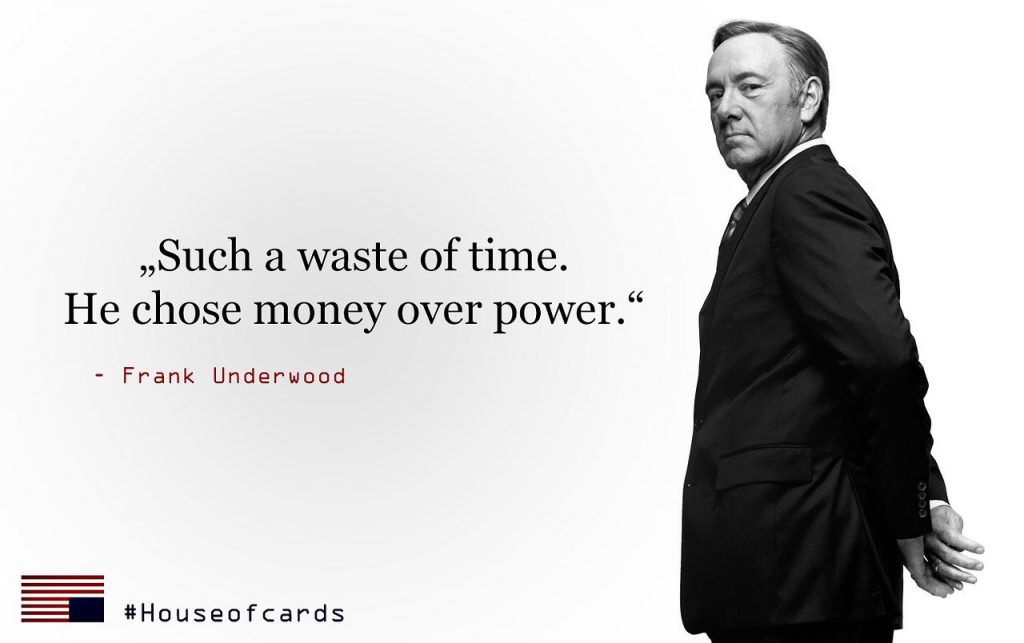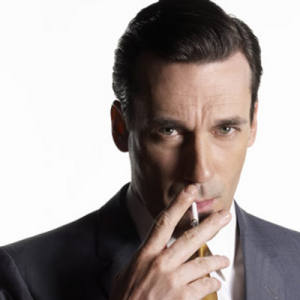At the end of every Tim Ferriss Show episode, Tim asks his guests the same question: “When you think of the word ‘successful,’ who is the first person that comes to mind and why?”
Listeners love it when the guest says, “My father. He worked 40 hour days at the car shop, didn’t speak any English, and gave my brother and me a life we could only dream of!”
It’s a valiant effort on behalf of the guest (and Tim) to remind us there are many versions of success.
But it’s not the truth.
The truth is when we say “successful,” we mean it in the Frank Underwood way.

He’ll explain it to you here
We mean wealth and power.
“But Margo,” you might be thinking, “What it means to live a good life is different for each person!!” And you would be right. But we don’t value living a good life (we care about it, but we don’t value it as a society). We value wealth and power.
Don’t believe me?
When was the last time that dad who works 40 hour days and doesn’t speak English made Time’s most influential list? Or what about the genius physicist whose papers’ haven’t been recognized by any major outlets. Anyone care about him? Find me a place where we’ve recognized or honored someone who doesn’t have an audience, a book deal, or a large amount of wealth or influence.
Listen, as humans and individuals, we care a lot about people living a good life, defined however you want to define “a good life.” But as a society, we rarely show interest in regular good people without any power or money.
I’m guessing right about now every bone in your body is ready to punch me in the face and defend our society’s moral fiber.
“We value good people, Margo!!” (I can see you trying to find counter examples just to “show that Margo idiot from the internet”). I’ll save you the trouble.
Of course, we value good people. But – and here’s where it gets interesting – why do you automatically assume wealthy and powerful people are not good people?
mmhmm that’s what I thought.
There are 3 invisible scripts around wealth and power that are clouding our ability to speak honestly about this topic. And if we have any chance of you making a difference in this world, I need you to challenge these scripts and embrace being wealthy and powerful.
I’ll start by diving into each script and then I’ll make the case for why they’re so destructive to our future success.
Invisible Script #1: “Wealthy and powerful” means “you’re an asshole”
It makes sense. We’ve (falsely) associated wealth and power with “being an asshole” because the successful people we’ve deified throughout history were (mostly) assholes.

I love 007, believe me. But…he’s an asshole. Imagine how he’d behave at Thanksgiving dinner? Like an asshole.
They were absentee fathers, neglectful husbands, and insufferable workaholics. They pushed the ethical boundaries of their time (not in a good way. In a “people got killed” way) and we gave them a free pass because “he revolutionized the [whatever] industry,” or “his invention changed the game.”
We love our Robber Barons and James Bond and Gordon Geko and Henry Ford. Fiction or real it doesn’t matter. These are the heroes we deify (even in infamy). Carl Ichan. Bobby “Axe” Axelrod. Steve Jobs. Jordan Belford. King Henry VIII. Don Draper. We love our assholes. (especially if they’re good looking).

Dammit, those cheekbones. You don’t even care that he’s literally the worst.
We never evaluate these men on the merits of their “good life” – the strength of their relationships, whether they were emotionally available for their loved ones, whether they had any relationship at all with their kids. Because if we did, we’d call them “failures.”
We don’t measure success that way. They get to be “successful” because of their power and wealth.
Invisible Script #2: “Corporations are greedy and evil”
This one gets fed to us early. It starts in our kids’ TV Shows and continues through elementary school curriculums. You know it as, “scrappy kid saves the world from EVIL CORPORATE GREED that’s polluting our oceans!” Every TV show you watched growing up had a version of that storyline, amiright?
This narrative also dominates our award-winning documentaries. Forks Over Knives, Mission Blue, Melting Ice, The True Cost. (That’s not to say it’s not true in these instances, only that it dominates). We’re always pointing a finger at corporate greed and wealth. There’s never an “it’s complicated” explanation. It’s always the same equation:
(Wealth + Power) = (Evil + Corrupt) = DESTROYING THE WORLD

The corporation is always the bad guy.
It’s also in our favorite action movies. Mission Impossible (Chimera, anyone?). The Manchurian Candidate. James Bond (Spectre). Terminator. Wall-E. Back To The Future. Avatar. A bagillion others.
We rarely see any instances where corporations do anything good. Which leads us to invisible script #3.
Invisible Script #3: It’s morally superior to not have money
This counter-narrative evolved as a response to the two narratives above. If you’re doing something “for the money” or “for the power” you’re probably a terrible person who “is evil and an asshole.” Alternately, according to this narrative, if you’re not after wealth and power, your motivations are somehow “purer.”
You often hear people say things like, “Oh you don’t need to pay me. I really care about this and I want to be involved.” It’s the moral high ground.
(You can feel the exhale, can’t you? When you read that line you were like “Oooo who is that wonderful person with wonderful motives? She just cares! How lovely and incorruptible.” Not so fast. We’ll get to that “incorruptible” part in a second.)
This narrative alone has allowed a lot of brilliant people to undervalue themselves and be taken advantage of. They feel “icky” for charging for their services or making money off something they love.
The invisible script says, “if you’re profiting, you no longer have the moral high ground.” You go down a wrung on the moral hierarchy. If you start to accrue wealth you are (say it with me) “evil and an asshole.”
Because to care about money is “selfish,” “greedy,” and not what good people do.
(This narrative was influenced a lot by western religions btw, but that’s another conversation for another time.)
Let’s talk about why these scripts are so dangerous.
Starting with the third one: “It’s morally superior to not have money.”
You’ve heard the cliche before: You can’t help others if you can’t help yourself. The reason it’s a cliche is the same reason all things become a cliche: It’s true.
I’m 7 episodes into Narcos and it’s clear that these drug lords would have no power if the people they sought to control had some cash. What pregnant mother in-her-right-mind would swallow 30 pellet’s of Cocaine for $15k if she wasn’t desperate for cash to support her family?

Such a creepy face. He makes bad decisions. Remember: he had NO MONEY.
Money can obstruct or enable bad decisions, depending on whether you have it or not. If you’re reading this and you’re considering swallowing coke pellets for $15k (maybe $30k in today’s money), it’s likely because you don’t have any money. Which means: it doesn’t make you morally superior to not have money. It makes you desperate and susceptible to making bad decisions.
Here’s why this is important:
Bad decisions and bad behavior don’t come out of bad people. They come out of desperation.
Good people are led to make bad choices when they’re between a rock and hard place – especially when it comes to money.
I’ve watched first hand as men I did business with lied to other men about cost, timelines, and claims (lied, not “bent the truth”) because they needed to pay the mortgage. They weren’t bad people, but they did bad things.
When it’s between your livelihood and the world’s, you’re going to choose yours every day of the week.
You can be benevolent and wonderful when your bills are paid, your heat is working, and your kids’ college fund is funded. Until then, your ethics (or just your heart) will be conflicted no matter how good of a person you are because you’re human and we’re susceptible to desperation when our own bed isn’t made.
You are granted the benefit of not being corruptible by money or power when you actually have it.
Which is why we can’t keep denying that money matters. If you’re really in this to make a difference, then you need to pay yourself and stop believing it’s honorable to go without.
When you’ve paid yourself, you can help others more.
Now for my next very-super-important point:
We need smart, not-asshole wealthy and powerful people to rule the world.
I can’t think of anyone more deserving of success (wealth + power) than truly good people. But if we keep demonizing wealth and power we’re gonna scare the good people into NGOs and non-profits where they fall victim to the “poor is noble” narrative up there and then fail to actually help anyone.
(No offense to NGOs and non-profits, that’s not to say you’re not wonderful (many of you are wonderful!!), but those of you that make a difference are well funded with a well-paid staff. I’ve worked with those of you that don’t have a well-paid staff and the results are, to quote the President, “SAD!” Plus, you’re dependent on wealthy donors and/or wealthy spouses to make it work so money matters here, too.)
Here’s what I’m getting at:
We’ve falsely assumed that wealth and power are diametrically opposed to kindness, selflessness, art, and world-changing.
They are not.
Bill Gates, Warren Buffet, J.K. Rowling, Peter Diamantes, and Lady O have shown us that you don’t have to be an ass if you’re wealthy and powerful. It’s a choice.

Not an asshole. Very wealthy and very powerful.
Imagine a world where we gossiped behind “successful” people’s backs about how “nice” they were? And I’m not just talking about philanthropy (you can be a philanthropist and an asshole…we all know them). I’m talking about “nice” in the “you’re a really good person” way.
You’re allotted an incredible platform on the world’s stage by virtue of wealth and power. Why shouldn’t good people be chasing that?
When you’re turned off by money and power, you’re effectively saying you’d like to dim the impact you want to have in the world.
Even Mother Teresa had power (otherwise you’d have never heard of her). The Dali Lama has power. Maya Angelou had power. Marcus Lemonis’ got power and money. Which is why they all are/were doing such great things.
If we have any hope of the good people taking over our political system, our corporations, or our research and academic institutions then we need to get them comfortable with money and power.
Money and power do not make you an asshole.
You make you an asshole.
The sooner you embrace that we need money and power to change the world – that you need to be successful – the better for the rest of us.




